Archaeology
Scientists try to replicate ancient butchering methods to learn how Neanderthals ate birds
It's hard to know what Neanderthals ate: food preparation, especially when it comes to smaller items like birds, can leave few archaeological traces. But understanding their diets is critical to understanding these incredibly ...
2 hours ago
1
0
Plants & Animals
The unintended consequences of success against malaria
For decades, insecticide-treated bed nets and indoor insecticide spraying regimens have been important—and widely successful—treatments against mosquitoes that transmit malaria, a dangerous global disease. Yet for a time, ...
7 hours ago
0
34

Taco-shaped arthropod fossils give new insights into the history of the first mandibulates
A new study, led by paleontologists at the Royal Ontario Museum (ROM) is helping resolve the evolution and ecology of Odaraia, a taco-shaped marine animal that lived during the Cambrian ...
A new study, led by paleontologists at the Royal Ontario Museum (ROM) is helping resolve the evolution and ecology of Odaraia, a taco-shaped marine animal ...
Evolution
7 hours ago
0
4

When searching for light and a mate in the deep, dark sea, male dragonfish grow larger eyes, scientists discover
A small but ferocious predator, the male dragonfish will apparently do anything for love. Or at least to find a mate. A study by researchers at Boston College found that the eyes of ...
A small but ferocious predator, the male dragonfish will apparently do anything for love. Or at least to find a mate. A study by researchers at Boston ...
Plants & Animals
7 hours ago
0
25

Butterflies accumulate enough static electricity to attract pollen without contact, research finds
Butterflies and moths collect so much static electricity while in flight, that pollen grains from flowers can be pulled by static electricity across air gaps of several millimeters ...
Butterflies and moths collect so much static electricity while in flight, that pollen grains from flowers can be pulled by static electricity across air ...
Plants & Animals
7 hours ago
1
24
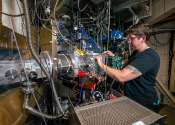
A new way to make element 116 opens the door to heavier atoms
Scientists at the Department of Energy's Lawrence Berkeley National Laboratory (Berkeley Lab) are credited in the discovery of 16 of the 118 known elements. Now they've completed the crucial first step to potentially create ...
General Physics
8 hours ago
1
13
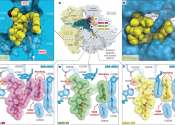
Dual action antibiotic could make bacterial resistance nearly impossible
A new antibiotic that works by disrupting two different cellular targets would make it 100 million times more difficult for bacteria to evolve resistance, according to new research from the University of Illinois Chicago.
Biochemistry
15 hours ago
0
101

Combining trapped atoms and photonics for new quantum devices
Quantum information systems offer faster, more powerful computing methods than standard computers to help solve many of the world's toughest problems. Yet fulfilling this ultimate promise will require bigger and more interconnected ...
Optics & Photonics
8 hours ago
0
98

Stress granules found to play an unsuspected role in blood vessel formation
The behavior of the cells that make up our blood vessels is crucial to our well-being. Conditions such as inflammation, oxygen deprivation and viral infection can stress these cells and disrupt the formation of new, often ...
Cell & Microbiology
8 hours ago
0
0
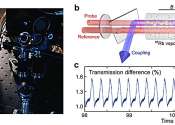
The experimental observation of a dissipative time crystal in a Rydberg gas
A dissipative time crystal is a phase of matter characterized by periodic oscillations over time, while a system is dissipating energy. In contrast with conventional time crystals, which can also occur in closed systems with ...

Uncovering the link between meltwater and groundwater in mountain regions
An international group of experts in mountain hydrology argue that the traditional understanding of the mountain water cycle has largely ignored the role that cryosphere-groundwater interactions play. This oversight could ...
Earth Sciences
9 hours ago
0
87

New work sheds light on nonlinear encoding in diffractive optical processors based on linear materials
UCLA researchers have conducted an in-depth analysis of nonlinear information encoding strategies for diffractive optical processors, offering new insights into their performance and utility. Their study, published in Light: ...
Optics & Photonics
9 hours ago
0
64
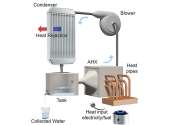
Compact atmospheric water harvesting device can produce water out of thin air
Earth's atmosphere holds an ocean of water, enough liquid to fill Utah's Great Salt Lake 800 times. Extracting some of that moisture is seen as a potential way to provide clean drinking water to billions of people globally ...
Engineering
8 hours ago
0
24

The Future is Interdisciplinary
Find out how ACS can accelerate your research to keep up with the discoveries that are pushing us into science’s next frontier
 Medical Xpress
Medical Xpress

'Mini lungs' research leads to multiple COVID-19 discoveries

Psychologists use 'Game of Thrones' to advance understanding of face blindness

Alzheimer's disease: Study suggests targeting oligodendrocytes could help reduce amyloid beta production

New study links brain microstructure to gender differences in mental health

New video test for Parkinson's uses AI to track how the disease is progressing

Handheld device offers lab-quality diagnostic testing

Defying global trends: Study finds high happiness, low depression among oldest Americans
 Tech Xplore
Tech Xplore

AI study reveals dramatic reasoning breakdown in large language models

Large language models don't behave like people, even though we may expect them to

Wearable sensors help athletes achieve greater performance

Materials improve hydrogen production from water using microwave radiation
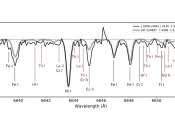
New extremely r-process-enhanced star detected
Using the Gran Telescopio Canarias (GTC), astronomers from the Chinese Academy of Sciences (CAS) and elsewhere have discovered a new extremely r-process-enhanced star in the Milky Way's thin disk. The finding was reported ...

Lightweight neural network enables realistic rendering of woven fabrics in real-time
Recent advances in the field of artificial intelligence (AI) and computing have enabled the development of new tools for creating highly realistic media, virtual reality (VR) environments and video games. Many of these tools ...

Front-line drug for ulcerative colitis found to have additional mechanism of action that until now remained elusive
Monoclonal antibodies have become indispensable in medicine to combat cancers, infectious diseases and autoimmune disorders. But the mechanism of action of a major monoclonal antibody developed for ulcerative colitis has ...
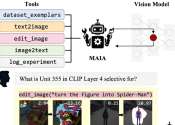
Multimodal agent can iteratively design experiments to better understand various components of AI systems
As artificial intelligence models become increasingly prevalent and are integrated into diverse sectors like health care, finance, education, transportation, and entertainment, understanding how they work under the hood is ...
Computer Sciences
9 hours ago
0
29

Digital food ordering drives increased indulgence and spending, study reveals
As restaurants increasingly embrace technology for placing food orders, a new University of South Florida study reveals that digital ordering platforms significantly influence consumer behavior, often leading to more indulgent ...
Social Sciences
10 hours ago
0
45
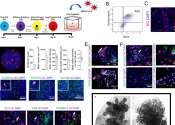
'Mini lungs' research leads to multiple COVID-19 discoveries
Scientists at Sanford Burnham Prebys, University of California San Diego and their international collaborators have reported that more types of lung cells can be infected by SARS-CoV-2 than previously thought, including those ...
Diseases, Conditions, Syndromes
10 hours ago
0
38
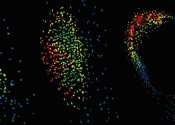
Next generation biosensor reveals gibberellin's critical role in legume nitrogen-fixation
Researchers at the University of Cambridge have demonstrated that the plant hormone gibberellin (GA) is essential for the formation and maturation of nitrogen-fixing root nodules in legumes and can also increase nodule size. ...
Biotechnology
11 hours ago
0
68
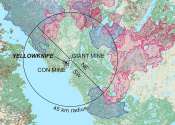
Yellowknife study warns of unprecedented arsenic release from wildfires
The wildfire season of 2023 was the most destructive ever recorded in Canada and a new study suggests the impact was unprecedented. It found that four of the year's wildfires in mine-impacted areas around Yellowknife, Northwest ...
Earth Sciences
11 hours ago
0
36
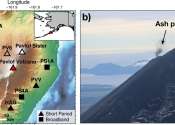
New automated system provides a way to detect elusive volcanic vibrations
A new automated system of monitoring and classifying persistent vibrations at active volcanoes can eliminate the hours of manual effort needed to document them.
Earth Sciences
11 hours ago
0
45

Psychologists use 'Game of Thrones' to advance understanding of face blindness
People who struggle with facial recognition can find forming relationships a challenge, leading to mental health issues and social anxiety. A new study provides insights into prosopagnosia or face blindness, a condition that ...
Psychology & Psychiatry
11 hours ago
0
13

Systematic monitoring: Gray wolf autopsy findings since the species' comeback to Germany
At the turn of the millennium, gray wolves returned to Germany after 150 years and subsequently established territories in many parts of the country. But coexistence harbors challenges—for both humans and animals. Since ...

Near-infrared photobiomodulation technique targets brain inflammation
As the world grapples with an aging population, the rise in neurodegenerative diseases such as Alzheimer's and Parkinson's is becoming a significant challenge. These conditions place a heavy burden not only on those afflicted ...

Study proposes changes to simplify legislation on Atlantic Rainforest biome and enhance conservation
A group of researchers has found that the key criteria according to which areas of the Atlantic Rainforest can be legally cleared by their owners are defined in too "subjective and imprecise" a manner in Brazil's environmental ...

Carbon dating: Developing a measurement tool for a 23-year-old cold case
When local law enforcement are unable to identify skeletal remains, they may seek out external resources and capabilities like those at Lawrence Livermore National Laboratory's (LLNL) Center for Accelerator Mass Spectrometry ...

New partnerships found to improve life satisfaction for single mothers
Ideally, a family is a protective space, a social network, and a team that supports each other. But what happens when children are raised by a single mother instead of two parents? Single mothers in particular can face significant ...

Researchers develop novel procedure for isolating primary mouse hepatocytes with holographic acoustic tweezers
Recently, a research team established a comprehensive procedure for isolating primary mouse hepatocytes and maintaining them in long-term culture with significant amplification in a two-dimensional (2D) environment. The team ...

In study of police, female officers perceived more danger, were more suspicious of civilians than male colleagues
How do female police officers, who are often excluded from the traditional masculine occupational culture of policing, feel about their working environment and how the public perceives them? A new study has used survey data ...

Boosting plant health: The role of gene exchange with bacteria
A recent study has unveiled how plants and bacteria exchange genes to boost plant health and development. The team discovered 75 genes that were transferred between small, fast-growing plants (Arabidopsis thaliana) and its ...

Streaming with more diversity? Study compares representation of minorities in broadcasting vs. streaming services
The representation of women, ethnic minorities, seniors and sexual minorities on streaming services and mainstream broadcasters falls short. This is shown in research conducted by communication scientist Serena Daalmans of ...

Q&A: Expert discusses political advertising in the 2024 election
Steve Caplan is no stranger to the high-stakes world of political advertising. With over 20 years of experience at the intersection of politics, advertising and marketing, Caplan brings real-world experience to his teaching ...

High-energy collision study reveals new insights into quark-gluon plasma
In high-energy physics, researchers have unveiled how high-energy partons lose energy in nucleus-nucleus collisions, an essential process in studying quark-gluon plasma (QGP). This finding could enhance our knowledge of the ...

New research proposes better carbon storage with stacked geology
The overarching goal of all carbon capture and storage projects is the same: Keep carbon dioxide (CO2) emissions out of the atmosphere by storing them in the subsurface for good.

Perceptions of income inequality drive consumers' interests in counterfeit luxury goods, study finds
The study found that as perceptions of income inequality increased, consumers value counterfeit luxury products for their "egalitarian value," a worth associated with the fake goods' perceived ability to restore equality ...

The silent spreader: Reassessing the role of mice in leptospirosis risk
Emerging research highlights mice as a critical yet underestimated source of leptospirosis, emphasizing the need for improved strategies to control the spread of the infectious disease.

Research team develops new antimalarial agent for combating drug-resistant parasites
Malaria remains a serious health issue globally, especially in Africa. The disease is caused by protozoan parasites in the Plasmodium genus. In 2021, there were 247 million cases of malaria and 619,000 deaths reported worldwide.

Lethal climate destruction: Linguistics researcher makes the case for using medical language in climate discourse
"Global warming," "greenhouse effect," and "climate catastrophe" are all terms we are familiar with from international public discourse on the looming effects of climate change. But these terms seem to be limited in their ...

Consortium offers perspectives on large cellular models and the future of AI-driven biological research
In a move to advance the frontiers of artificial intelligence, the Quantitative Biology journal has published a commentary titled "Current Opinions on Large Cellular Models," highlighting the cutting-edge developments in ...

'Floating duck syndrome' can trick people into working hard while failing to achieve their goals
When people present themselves as being effortlessly high-achieving or "perfect," this phenomenon can deceive onlookers into believing success is more easily achieved than it actually is—and lead them to underinvest effort ...

HR departments 'not trusted' to deal with bullying, finds study
Employees have little trust in Human Resources departments to deal fairly and effectively with workplace bullying, according to a new study published in the Journal of Business Ethics.

Opening a window on environmental phenomena with new imaging technology
Data collected by satellites, drones, radars and microscopes provide a goldmine of information to better understand our environment. And when these data are coupled with artificial intelligence (AI), they can unlock the secrets ...





































































